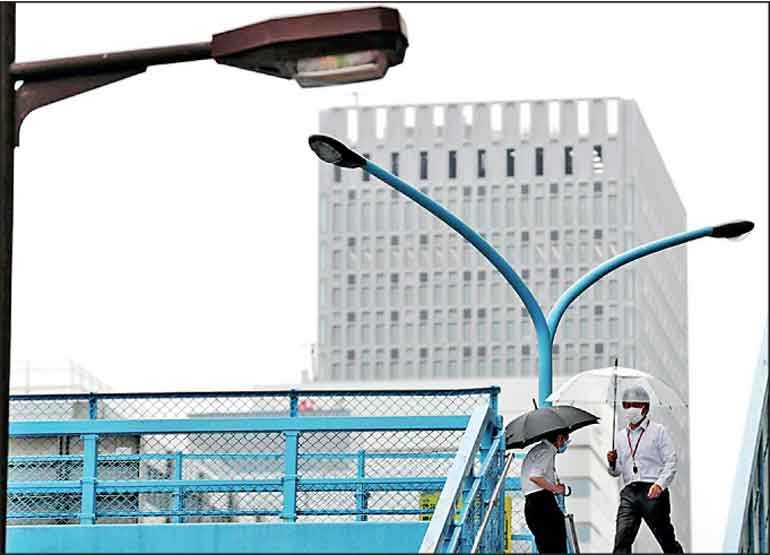Wednesday Feb 25, 2026
Wednesday Feb 25, 2026
Saturday, 15 August 2020 00:00 - - {{hitsCtrl.values.hits}}

A man wearing a protective face mask, following the coronavirus disease (COVID-19) outbreak, walks on a pedestrian overpass at a business district in Tokyo, Japan, 18 May – Reuters
TOKYO (Reuters): Japan’s economy will contract more than previously expected and suffer mild deflation during the current fiscal year, analysts predict, underscoring the fragile nature of the recovery from the devastating coronavirus pandemic.
Analysts also see renewed, escalating tensions between the United States and China as an additional source of concern for the world’s third-largest economy, which is heavily reliant on exports, a Reuters poll showed on Friday.
“Economic activity will continue to face restrictions from social distancing measures” needed to prevent the spread of the virus, said Taro Saito, executive research fellow at NLI Research Institute.
“Japan’s economy will likely rebound next fiscal year but won’t recoup the huge losses incurred this year,” he said.
The economy is forecast to shrink 5.6% in the current fiscal year to next March, the poll of 32 economists showed, more than a 5.3% contraction projected last month. In a worst case scenario it will shrink 8.0%.
The downgrade came as many analysts revised their forecasts for April-June gross domestic product (GDP) to a 27% contraction - last month’s worst case forecast - from a nearly 24% drop projected in July.
The government will publish April-June GDP data on Monday.
Japan’s economy will grow just 3.3% in the following year beginning in April 2021, the Aug. 4-13 poll showed, unchanged from the previous poll in July.
Core consumer prices, which exclude volatile fresh food but includes energy costs, will fall 0.3% this fiscal year and rebound just 0.2% next year, according to the poll.
With the economy in deflation and its 2% inflation target proving increasingly elusive, the Bank of Japan’s next move will be an expansion of stimulus, said a majority of those polled.
“The battle against the coronavirus will be a long one. Governments and central banks can’t end steps to combat the pandemic until an effective vaccine becomes available,” said Mari Iwashita, chief market economist at Daiwa securities.
A recent sharp deterioration in US-China relations could complicate the outlook, as the world’s two largest economies disagree on issues such as trade, technology and the pandemic.
Asked how the conflict between the two nations will affect Japan’s economy, about 90% of economists surveyed said it would have a negative impact.
Over 80% of respondents also said Japanese companies would face adverse effects if Washington and Beijing move toward creating their own economic zones, which would mark a retreat of globalisation.
“Economic blocs led by those two countries, or de-globalisation, would lower global productivity growth. That would have a negative impact on Japan’s potential growth and Japanese firms’ productivity growth,” said Hiroshi Ugai, chief economist at JPMorgan Securities Japan.